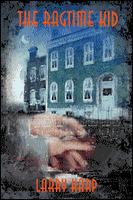
The Ragtime Kid
By Larry Karp
Poisoned Pen Press
1-59058-326-4
Ragtime’s historical and critical stock has risen significantly in the time since it was played by the likes of Scott Joplin and Tom Turpin. As Larry Karp’s novel The Ragtime Kid, makes acutely clear, racial attitudes blinded many to the aesthetic qualities of the music.
Karp has written a mystery around actual events which took place in Sedalia, MO around the turn of the century, featuring the historical figures of Scott Joplin; John Stark, a music store owner who would become the leading music publisher of ragtime; and Brun Campbell, the “Ragtime Kid,” a white ragtime pianist who studied under Joplin. In an informative afterward, Karp explains the historical questions which formed the conceit of his fictional mystery:
“Why did a man nearly sixty years old, proprietor of a successful music store, who’d done no more than dabble in music publishing by printing copies of a few very conventional pieces, decide to bring out the work of an unknown young black composer? Why did that composer, so determined to write “respectable” music, entrust his work to such an inexperienced publisher? And above all, why did John Stark agree to a royalties contract, such a striking exception to common practice of the time?” (p. 343)
What follows is a mystery story that attempts to fill those holes in the historical record. There is no mystery as to who the villains are in Karp’s story, as led by Elmo Freitag, a former Confederate would-be music publisher and abetted by his brutish white trash henchmen. Freitag enters the story as an odious figure, and Karp continues debase his character as the story progresses, to the point of near over-kill. However, more than the crime story, the real strength of Karp’s novel comes through his portrayal of ragtime music and the contemporaneous world of music publishing. His respect for Joplin’s music is evident throughout. At one point the fictional Joplin explains his music to Campbell:
“My ragtime is different from the ragtime you hear in hotels and saloons and parlors. Those tunes develop—usually start from a melody that’s been around forever, then as people play it, they add a little of this, a little of that. Like the songs minstrels sang in Europe, no two singers the same, and the song as it was sung in 1700 was not even recognizable in 1800. But my music is composed. It is high-class music, no different from a song by Schubert, a concerto by Mozart, or a Beethoven symphony.” (p. 80)
Despite the strengths of Ragtime Kid, it would have benefited from some prudent editing. At times it is a little talky, with a few too many conversations recapping other conversations. Once into the novel, Karp does pull readers through the story, effectively using the racial realities of 1899 Missouri to dramatically increase the suspense. The threat of violence to Stark, an abolitionist before serving in the Union army, and to African-Americans like Joplin, as well as whites like Campbell who might befriend them, was all too real in the Sedalia of that time. Ragtime Kid does capture the resulting tension, and conveys some legitimate insight into the music of the ragtime era, in a quite satisfying novel.